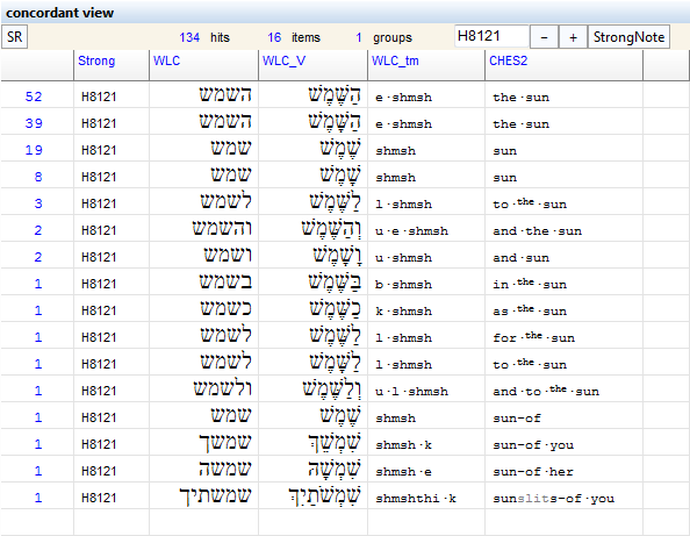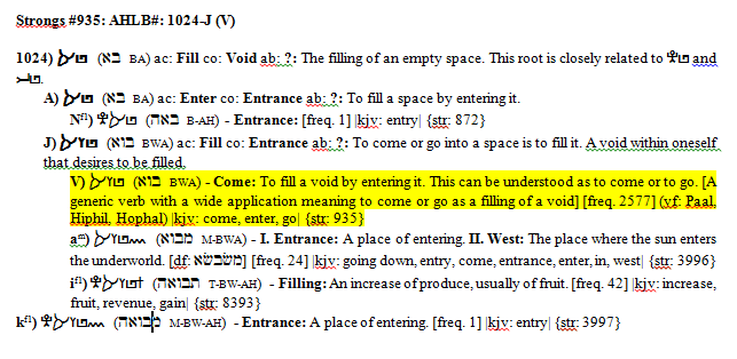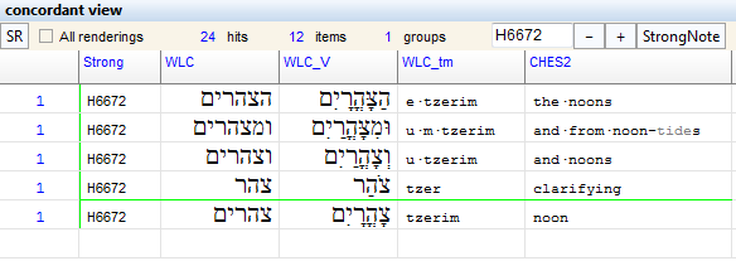Background
Introduction
Exodus 12:6 The Scriptures 1998+
(6) ‘And you shall keep it until the fourteenth day of the same month. Then all the assembly of the congregation of Yisra’ĕl shall kill it between the evenings.
Exodus 12:6 NASB
'You shall keep it until the fourteenth day of the same month, then the whole assembly of the congregation of Israel is to kill it at twilight.
The word twilight is #6153 in Strong's Hebrew Concordance which means: evening, between the two evenings, used to mark the time when the Passover lamb was killed.
| H996 - Original: בּין - Transliteration: Beyn - Phonetic: bane - Definition: 1. between, among, in the midst of (with other preps), from between - Origin: (sometimes in the pl. masc. or fem.) properly, the constructive form of an otherwise unused noun from H995 - TWOT entry: 239a - Part(s) of speech: Masculine - Strong's: (Sometimes in the plural masculine or feminine); properly the constructively contracted form of an otherwise unused noun from H995; a distinction; but used only as a preposition between (repeated before each noun often with other particles); also as a conjugation either... or: - among asunder at between (-twixt . . . and) + from (the widest) X in out of whether (it be... or) within. | H6153 - Original: ערב - Transliteration: `ereb - Phonetic: eh'-reb - Definition: 1. evening, night, sunset a. evening, sunset b. night - Origin: from H6150 - TWOT entry: 1689a - Part(s) of speech: Noun Masculine - Strong's: From H6150; dusk: - + day even (-ing tide) night. |
Evening and Morning
Genesis 1:13 NASB
There was evening and there was morning, a third day.
Day and Night
Genesis 1:5 NASB
God called the light day, and the darkness He called night. And there was evening and there was morning, one day.
Genesis 1:18 NASB
and to govern the day and the night, and to separate the light from the darkness; and God saw that it was good.
So, now we know that evening is not the same as night (darkness) and is most certainly over by the time morning arrives.
Refining Evening
We also see from Genesis that evening is sometime before the night based on the angels coming and meeting Lot at Sodom during the evening and lot inviting them to stay the night at this house:
Genesis 19:1-2 NASB
Now the two angels came to Sodom in the evening as Lot was sitting in the gate of Sodom. When Lot saw them, he rose to meet them and bowed down with his face to the ground. (2) And he said, "Now behold, my lords, please turn aside into your servant's house, and spend the night, and wash your feet; then you may rise early and go on your way." They said however, "No, but we shall spend the night in the square."
Deuteronomy provides an additional piece of insight into the timing of the “evening” when the lamb was to be slaughtered:
Deuteronomy 16:5-7 NASB
(5) "You are not allowed to sacrifice the Passover in any of your towns which the LORD your God is giving you; (6) but at the place where the LORD your God chooses to establish His name, you shall sacrifice the Passover in the evening at sunset, at the time that you came out of Egypt. (7) "You shall cook and eat it in the place which the LORD your God chooses. In the morning you are to return to your tents.
From the Ancient Hebrew Lexicon of the Bible we see the following entry with the definition for this particular Strong’s number highlighted:
Psalm 55:17 puts a lower bound on the timing of evening and also aligns with the preceding conclusions.
Psalms 55:17 NASB
Evening and morning and at noon, I will complain and murmur, And He will hear my voice.
A confirmation of this idea can be found in Jeremiah:
Jeremiah 6:4 NASB
"Prepare war against her; Arise, and let us attack at noon. Woe to us, for the day declines, For the shadows of the evening lengthen!
Final Observations
So based on the scripture we have seen this puts us somewhere between the moments following Noon and darkness which occurs at some period after the sun sets below the horizon. If we assume that it takes an hour for darkness to set in after sunset then we have a range of time from roughly noon -7:15pm what might constitute “evening.”
This lines up with the NT scripture where the general consensus is that Yeshua died sometime around 3pm since he is our Passover lamb and Yahweh would have ensured that he fulfilled Passover with Yeshua perfectly.
Now that we have a scripturally-based definition of evening. What about “between the evenings?”
During this study nothing was identified in the scripture that conclusively explains the plurality of the phrase "between the evenings". We see a variety of terms in the scripture, Elohim comes to mind, that is plural in Hebrew but is a singular term. Perhaps in the phrase something similar is going on even though the word for evening here is also found in the singular in the scripture.
Alternatively, since we have to be talking about a singular day (Abib 14) here we cannot possibly be talking a about the evenings of two separate days. So, this expression still has to be referring to the Noon+ to dark time period. With that in mind, if you consider that this period is a series of moments and there is a beginning and ending moment of this period we have defined then the “between the evenings” is still just the single 7+ hour time period on Abib 14.
Potential Impact of the Conclusions Drawn
Genesis 1:5 NASB
God called the light day, and the darkness He called night. And there was evening and there was morning, one day.
H.U.B. Comments
Proverbs 27:17 The Scriptures 1998+
(17) Iron is sharpened by iron, And a man sharpens the face of his friend.
1 Thessalonians 5:20-21 The Scriptures 1998+
(20) Do not despise prophecies, (21) prove them all. Hold fast what is good.
Titus 1:9 The Scriptures 1998+
(9) clinging to the trustworthy word, according to the teaching, in order to be able both to encourage by sound teaching, and to reprove those who oppose it.
The H.U.B.




 RSS Feed
RSS Feed
